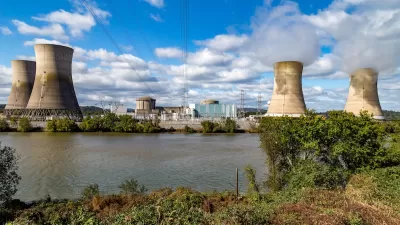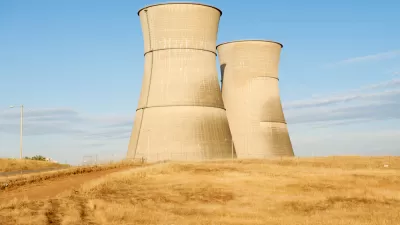Nuclear power plants around the country are shutting down. The communities where nuclear plants have been located for decades will now have to figure out how to rebuild their economies without them.

"There’s at least one thing worse than having a nuclear power plant in your town," writes Alan Greenblatt. "That’s having your nuclear power plant shut down."
Greenblatt sums up the issues that arise after a nuclear plant closes:
For obvious reasons, nuclear power plants were mostly built in fairly remote places, away from population centers. But they’re big facilities, with highly paid staff. When one of them closes, it can leave enormous holes in the local tax base.
The occasion for Greenblatt's analysis is the recent announcement by Exelon Corp that it will close down Three Mile Island in 2019. Three Mile Island is the site of the worst nuclear disaster in U.S. history, so Greenblatt's lede is all the more pointed.
Greenblatt says previous plant closures have preceded population losses and increased taxes. When the Vermont Yankee plant in Vernon, Vermont shut down in 2014, the local economy lost $100 million of activity. Another case study is offered by San Luis Obispo, in California, where the Diablo Canyon reactor is shutting down. Greenblatt suggests such towns will be challenged by implementing a new lens for their long-term strategic planning: one without the built in economic engine of a nuclear power plant.
FULL STORY: This Is What Happens When a Nuclear Plant Shuts Down

Alabama: Trump Terminates Settlements for Black Communities Harmed By Raw Sewage
Trump deemed the landmark civil rights agreement “illegal DEI and environmental justice policy.”

Planetizen Federal Action Tracker
A weekly monitor of how Trump’s orders and actions are impacting planners and planning in America.

How Atlanta Built 7,000 Housing Units in 3 Years
The city’s comprehensive, neighborhood-focused housing strategy focuses on identifying properties and land that can be repurposed for housing and encouraging development in underserved neighborhoods.

In Both Crashes and Crime, Public Transportation is Far Safer than Driving
Contrary to popular assumptions, public transportation has far lower crash and crime rates than automobile travel. For safer communities, improve and encourage transit travel.

Report: Zoning Reforms Should Complement Nashville’s Ambitious Transit Plan
Without reform, restrictive zoning codes will limit the impact of the city’s planned transit expansion and could exclude some of the residents who depend on transit the most.

Judge Orders Release of Frozen IRA, IIJA Funding
The decision is a victory for environmental groups who charged that freezing funds for critical infrastructure and disaster response programs caused “real and irreparable harm” to communities.
Urban Design for Planners 1: Software Tools
This six-course series explores essential urban design concepts using open source software and equips planners with the tools they need to participate fully in the urban design process.
Planning for Universal Design
Learn the tools for implementing Universal Design in planning regulations.
Jessamine County Fiscal Court
Caltrans
Institute for Housing and Urban Development Studies (IHS)
City of Grandview
Harvard GSD Executive Education
Toledo-Lucas County Plan Commissions
Salt Lake City
NYU Wagner Graduate School of Public Service





























